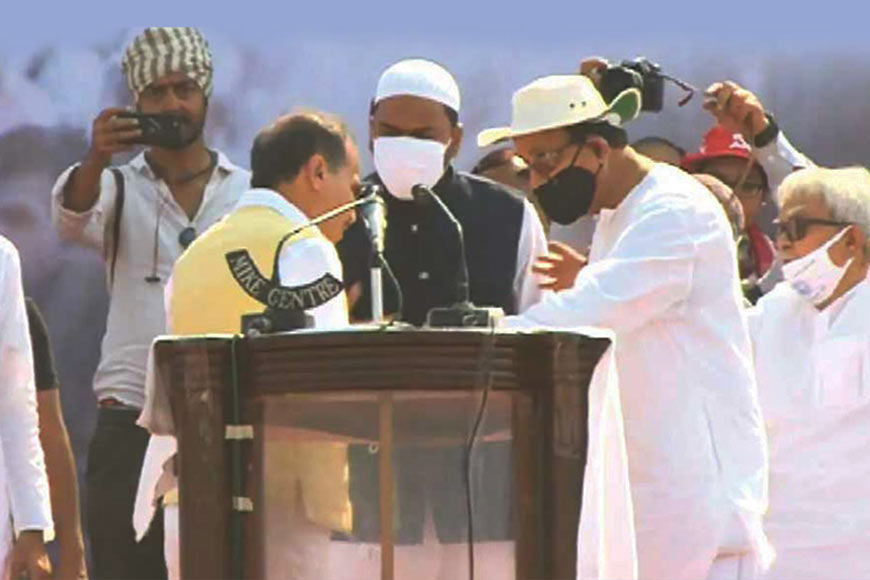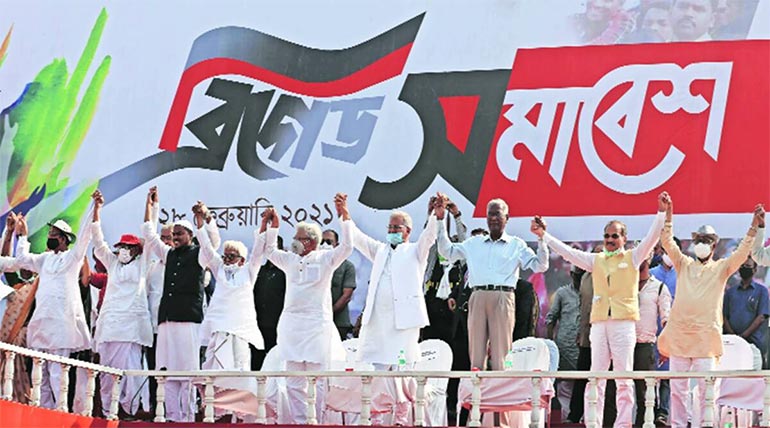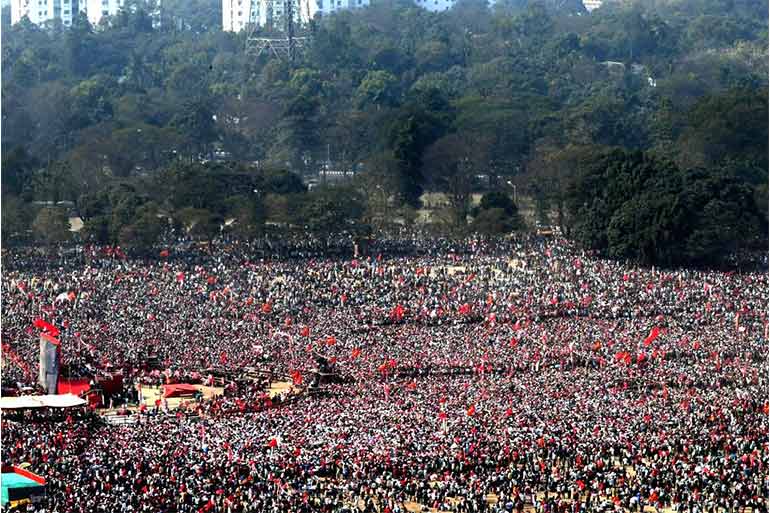The broken rhythm of the Brigade

Last Sunday, the Brigade Parade Ground was host to a United Front (Sanyukta Morcha) election rally. Today, it is Prime Minister Narendra Modi’s turn. For more reasons than one, last Sunday’s rally will remain significant for the politics of this state.
The stated objective of the rally was to provide an alternative platform for anti-BJP forces. Over the past decade, through several movements, the Left Front has sought to build an extensive network by combining 17 parties of varying strength. For all practical purposes, however, seat sharing has remained restricted to the CPIM-CPI-Forward Bloc troika. In the recent Bihar elections, the CPI(ML) notched up significant successes by entering a seat-sharing agreement with the Congress-RJD combine even while staying within the Left Front. In West Bengal, however, there is no sign of the smaller parties.
The new ally for the Left-Congress combine has come in the form of the newborn Indian Secular Front (ISF), led by Abbas Siddiqui, the pirzada of Furfura Sharif, whose extremely vocal followers made their presence felt at the rally. However, at his debut rally on the Maidan, Siddiqui caused three major breaks in the flow of events.
Lalu Prasad Yadav’s RJD has long been a Left ally in Bengal, just as Sharad Pawar’s NCP is part of the Left cabinet in Kerala. The buzz is that Left Front bigwig Biman Bose had allocated three seats each for the two parties, but both are now busy discussing seat-sharing strategies with the Trinamool Congress (TMC). At Sunday’s rally, Lalu’s son Tejaswi failed to make an appearance even though he was in town. Instead, he met Chief Minister Mamata Banerjee at Nabanna the next day. Similarly, though it has lent visible support to various Left protests, the SUCI has not indicated any desire to share seats with the Left Front. Neither has Bose been forthcoming about allocating seats to other Left parties.

The new ally for the Left-Congress combine has come in the form of the newborn Indian Secular Front (ISF), led by Abbas Siddiqui, the pirzada of Furfura Sharif, whose extremely vocal followers made their presence felt at the rally. However, at his debut rally on the Maidan, Siddiqui caused three major breaks in the flow of events. The first was when a few of his followers mounted the dais during Surjya Kanta Mishra’s speech, causing an uproar among the crowd. Mishra went into damage control mode, announcing that ISF leaders had taken the stage. On the second occasion, Siddiqui himself went up on stage in the middle of Pradesh Congress chief Adhir Chowdhury’s speech. Noticing the stir this caused in the crowd, Chowdhury sought to end his speech. But the third push was the strongest as, in an apparent jab at the Congress, Siddiqui announced, “We do not seek any favours, we seek partnership.”
Also read : The Brigade wave
Awkward moments such as these at joint rallies need someone to manage them. In 1974, at a rally at the same venue, Jayprakash Narayan was scheduled to be the sole speaker, with the proposal to be read out by economist Ashok Mitra. Present on the dais were leaders of the calibre of Prafulla Sen and Jyoti Basu. At one point, a section of the crowd began chanting Basu’s name. Sensing the mood, Narayan invited Basu to share the speaker’s podium, and silence immediately descended on the restive sections. Chowdhury would perhaps have done well to follow that example.

Siddiqui himself went up on stage in the middle of Pradesh Congress chief Adhir Chowdhury’s speech. Noticing the stir this caused in the crowd, Chowdhury sought to end his speech. But the third push was the strongest as, in an apparent jab at the Congress, Siddiqui announced, “We do not seek any favours, we seek partnership.”
It is perhaps a sign of his political immaturity that Siddiqui took the course he did. However, he does need to remember a few things. While he is yet to reach an agreement on seat-sharing with the Congress, the Muslims of North Bengal sided with Congress, not TMC, during the Vidhan Sabha elections of 2011 and 2016. The Congress tied up with TMC in 2011, when loyalty to TMC was still the motto at Furfura Sharif, courtesy Firhad Hakim.
Even more importantly, Siddiqui is on a mission to build a platform comprising Muslims, Dalits, and other minorities in the state. But he needs to remember that the Muslims of West Bengal do not have a history of any such platform, preferring to stay with mainstream political parties. Even though the Muslim League was a factor in the early years of East Pakistan, their existence received a jolt from the United Front of Fazlul Haque and Satin Sen during the Language Movement of 1952 and the elections of 1954. And even though Hasanuzzaman’s Muslim League won a seat in Bengal, it never really made a mark. Rather, the likes of Sayyad Nausher Ali and Sayyad Badruzza built careers around secular politics.
If Abbas Siddiqui is to remember this past, he needs to be more responsible.










